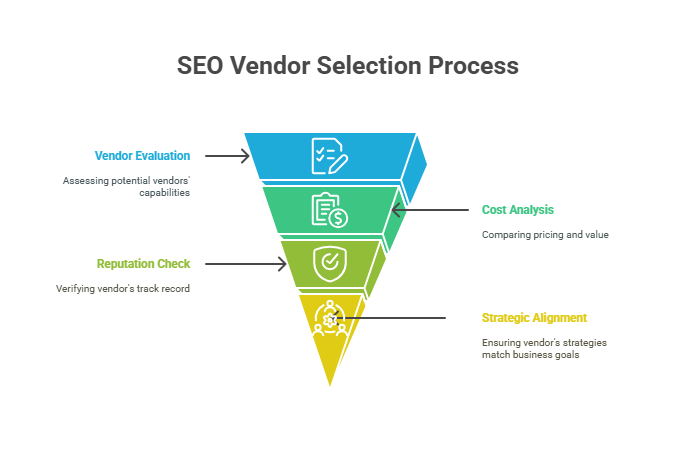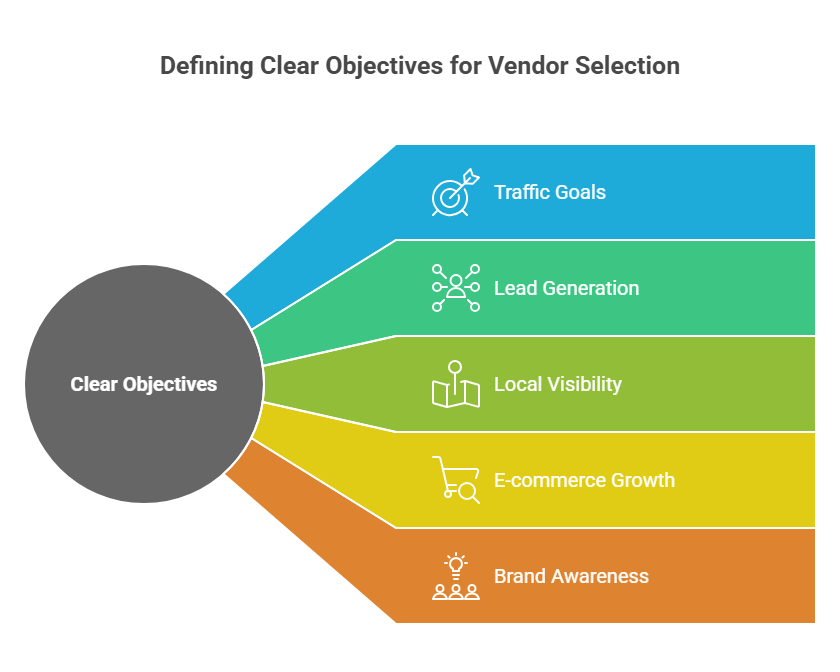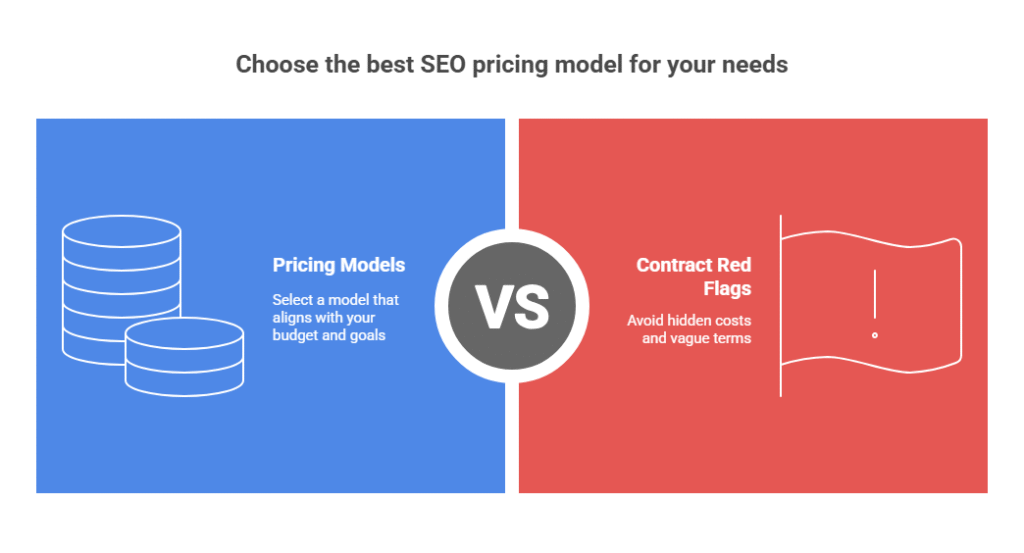Struggling to choose a trustworthy SEO vendor? You’re not alone. 64% of businesses report being burned by unreliable SEO agencies, according to recent industry research.
The digital marketing landscape is flooded with agencies making bold promises, but separating the wheat from the chaff requires a strategic approach.
Finding the right SEO partner isn’t just about picking someone with a flashy website or the lowest price tag. It’s about identifying a vendor who understands your business goals, has a proven track record, and can adapt to the ever-evolving world of search engine optimization.
This guide will arm you with the knowledge and tools you need to make an informed decision that could transform your online presence.
Why Finding the Right SEO Vendor Matters More Than Ever
In today’s hyper-competitive digital landscape, your choice of SEO vendor can literally make or break your online success.
The wrong partner doesn’t just waste your time and money – they can actually damage your website’s reputation with search engines, setting your business back months or even years.

Consider this: organic search drives 53% of all website traffic, making it the largest source of trackable website traffic. That’s more than half of your potential customers finding you through search engines. Can you really afford to trust this crucial channel to just anyone?
“The biggest mistake I see businesses make is choosing an SEO agency based on price alone. The cheapest option almost always costs the most in the long run when you factor in poor results and recovery time.” – Neil Patel, NeilPatel.com
The Real Cost of Choosing Wrong
When businesses choose the wrong SEO vendor, the consequences extend far beyond wasted marketing budget. Here’s what typically happens:
- Algorithm Penalties: Poor SEO practices can trigger Google penalties that tank your rankings overnight
- Lost Opportunities: While you’re spinning your wheels with an ineffective vendor, competitors are capturing your market share
- Brand Damage: Low-quality content and spammy link-building can hurt your brand’s reputation
- Recovery Time: Fixing SEO damage often takes 2-3 times longer than doing it right the first time
- Internal Frustration: Poor results create tension between marketing teams and leadership
Common Red Flags That Trap Smart Business Owners
Even experienced entrepreneurs fall into these traps when selecting SEO vendors:
- Guaranteed Rankings: Anyone claiming “#1 on Google in 30 days” is either lying or using black-hat techniques that will backfire
- One-Size-Fits-All Packages: Your business is unique, and your SEO strategy should be too
- Lack of Transparency: Vendors who can’t clearly explain their methods or provide detailed reporting
- Price-Only Decisions: The cheapest option often costs the most in the long run
- Impressive Sales Presentations: Flashy pitches don’t always translate to effective execution
Step-By-Step Guide to Finding Reliable SEO Vendors
Now that you understand the stakes, let’s dive into a systematic approach for identifying and vetting potential SEO partners. This process might seem thorough, but remember – you’re making a decision that could impact your business for years to come.
1. Define Your SEO Goals and Budget First
Before you even start looking at vendors, you need crystal-clear objectives. This isn’t just about wanting “more traffic” – that’s like saying you want “more money.” You need specific, measurable goals that align with your business strategy.
- Traffic Goals: Do you want more visitors, or do you want the right visitors? Quality beats quantity every time
- Lead Generation: Are you looking to fill your sales funnel with qualified prospects who are ready to buy?
- Local Visibility: Is your business location-dependent? Local SEO requires entirely different strategies than national campaigns
- E-commerce Growth: Online stores need product-focused SEO, category optimization, and conversion rate optimization
- Brand Awareness: Sometimes the goal is establishing thought leadership and brand recognition in your industry

Next, set a realistic budget. Small businesses typically invest $1,500-$5,000 monthly for professional SEO services, while mid-size companies often spend $5,000-$15,000 monthly according to recent Ahrefs research.
2. Research and Verify Industry Experience
Experience isn’t just about years in business – it’s about relevant, successful experience in your industry or similar challenges. A vendor who’s great at local SEO for restaurants might struggle with SaaS companies, and vice versa.
Here’s what to evaluate:
- Years in Business: Look for vendors with at least 3-5 years of experience who’ve weathered multiple Google algorithm updates
- Industry Focus: Ask for specific case studies from your sector. B2B, e-commerce, local businesses, and enterprise companies all have different SEO needs
- Team Expertise: Ensure their team includes technical SEO specialists, content strategists, and link-building experts
- Certifications: While not required, certifications from Google, HubSpot, or other recognized organizations show commitment to staying current
“Look for agencies that can show you not just what they did, but why they did it and how they measured success. Strategy matters more than tactics.” – Rand Fishkin, SparkToro
3. Evaluate Their SEO Process and Methodology
A vendor’s process reveals their professionalism, strategic thinking, and likelihood of delivering consistent results. Professional SEO isn’t random – it follows proven methodologies adapted to specific situations.
Ensure they follow current best practices:
- Google’s E-A-T Guidelines: How do they build Expertise, Authoritativeness, and Trustworthiness?
- Core Web Vitals: Their approach to page experience signals and technical performance
- Helpful Content Updates: How they ensure content serves users, not just search engines
- AI Integration: 78% of top SEO agencies now use AI tools for keyword research and content optimization according to SEMrush’s 2025 report
Ask about their tool stack. Professional vendors should use advanced tools like:
- Ahrefs or SEMrush: For comprehensive keyword research and competitor analysis
- Screaming Frog: For technical SEO auditing
- Google Search Console & Analytics: For performance tracking
- Surfer SEO or Clearscope: For content optimization
4. Review Case Studies and Request References
This is where the rubber meets the road. Anyone can talk a good game, but case studies reveal actual execution and results. However, not all case studies are created equal.
Request at least 2-3 detailed case studies that include:
- Initial Situation: What challenges did the client face? What was their starting point?
- Strategy Overview: What approach did the vendor take? Why those specific tactics?
- Implementation Timeline: How long did different phases take?
- Specific Results: Concrete numbers with timeframes, not vague “significant improvements”
- Challenges Overcome: What obstacles arose and how were they handled?
Be skeptical of cases that show impossibly fast results. Significant SEO improvements typically take 4-6 months minimum according to Google’s SEO documentation.
5. Understand Pricing Models and Contract Terms
SEO pricing can vary dramatically, and understanding different models helps you make informed comparisons while avoiding hidden costs.

ls include:
- Fixed Monthly Retainer: Predictable costs with agreed-upon deliverables
- Performance-Based Pricing: Payments tied to specific results like rankings or traffic increases
- Project-Based Pricing: One-time fees for specific initiatives like site audits
- Hourly Consulting: Pay-as-you-go for strategic advice
Watch out for red flags in contracts:
- Long-term contracts with no performance guarantees
- Hidden fees for tools or reporting
- Vague scope definitions that allow for scope creep
- No clear termination clauses
6. Test Communication and Reporting Quality
SEO is complex, technical, and constantly evolving. Your vendor needs to be able to explain what they’re doing, why they’re doing it, and what results you can expect – all in language that makes sense to you.
During your evaluation process, pay attention to:
- Technical Translation: Can they explain complex SEO concepts without drowning you in jargon?
- Response Time: How quickly do they respond to emails and questions?
- Proactive Communication: Do they anticipate your questions and provide context?
- Report Quality: Ask to see a sample report – it should focus on business outcomes, not just rankings
“The best SEO agencies don’t just report numbers – they tell the story behind the numbers and explain what it means for your business.” – Brian Dean, Backlinko
2025 SEO Trends: What to Look for in Modern Vendors
The SEO landscape evolves rapidly, and vendors who aren’t adapting to 2025 trends will struggle to deliver competitive results. Here’s what cutting-edge SEO vendors are doing differently this year:
AI-Powered SEO Strategies
Leading vendors are strategically integrating AI tools while maintaining human oversight. Look for agencies that use:
- AI for Content Research: Tools like Jasper.ai and Copy.ai for content ideation and optimization
- Automated Technical Audits: AI-powered site crawling with human analysis
- Predictive Analytics: Using machine learning to forecast SEO performance trends
- Smart Keyword Clustering: AI-driven topic modeling for comprehensive content strategies
User Experience Integration
Core Web Vitals now impact 12% of ranking factors according to Moz’s latest study. Modern vendors should focus on:
- Page loading speed optimization
- Mobile-first indexing compliance
- User engagement metrics tracking
- Conversion rate optimization integration
Privacy-First SEO Approaches
With increasing privacy regulations, top vendors are adapting their tracking and measurement strategies:
- First-party data collection strategies
- Privacy-compliant analytics implementation
- Cookie-less tracking solutions
Red Flags vs Green Flags: Quick Comparison
| Evaluation Area | Green Flags | Red Flags |
|---|---|---|
| Promises & Guarantees | Realistic timelines, qualified predictions, transparent about challenges | Guaranteed #1 rankings, instant results, “we know Google’s algorithm” |
| Reporting | Business-focused KPIs, actionable insights, regular communication | Vanity metrics only, vague reports, poor communication |
| Pricing | Transparent pricing, value-based structure, clear scope | Extremely cheap, hidden fees, long-term locks without guarantees |
| Case Studies | Detailed results, industry-relevant, verifiable data | Generic claims, no specifics, unverifiable results |
Critical Questions to Ask During Vendor Interviews
Use these questions during vendor interviews to ensure you’re getting complete, honest answers:
Strategy and Process Questions
- “Walk me through your SEO audit process.” Should include technical, content, and competitive analysis
- “How do you prioritize SEO initiatives?” Tests strategic thinking and resource allocation
- “What’s your approach to keyword research in 2025?” Should mention user intent, not just search volume
- “How do you handle algorithm updates?” Look for proactive monitoring and adaptation strategies
- “Can you show me a recent client success story?” Detailed explanations of strategy and results
Team and Accountability Questions
- “Who will manage my account day-to-day?” Understand who you’ll actually work with
- “What happens if results don’t meet expectations?” Tests accountability and problem-solving
- “How do you measure success?” Should focus on business outcomes, not just rankings
- “Can you provide current client references?” Confidence in client satisfaction
Making Your Final Decision
After evaluating multiple vendors, use this framework to make your final choice:
Score Each Vendor Objectively
Create a scoring system (1-10) for each criteria:
- Industry experience and specialization
- Case study quality and relevance
- Communication effectiveness
- Tool sophistication and reporting quality
- Pricing value and contract terms
- Team expertise and cultural fit
Trust Your Instincts on Cultural Fit
SEO partnerships often last years. Beyond technical competence, consider whether you enjoy working with their team and if they truly understand your business.
Start with a Trial Project
Consider beginning with a project-based engagement like an SEO audit before committing to a long-term retainer. This allows you to evaluate their work quality with limited risk.
Conclusion
Finding a reliable SEO vendor doesn’t have to be a frustrating guessing game. Armed with this guide, you now have a systematic approach to identify, evaluate, and select an SEO partner who can truly transform your online presence.
Remember the key principles: start with clear goals, prioritize experience and trust signals, demand transparency in processes and reporting, and never sacrifice quality for a lower price. The right SEO vendor will welcome your thorough evaluation process because they’re confident in their ability to deliver results.
Take your time with this decision. The vendor you choose today will influence your online success for months or years to come. Use this guide, ask the hard questions, and prepare to see what professional SEO can really do for your business.
Frequently Asked Questions
How long does SEO take to show results?
SEO typically takes 4-6 months to show noticeable improvements, depending on your website’s current state and competition level. Be skeptical of anyone promising significant results in weeks rather than months.
What should I budget for professional SEO services?
Small businesses typically spend $1,500-$5,000 monthly, while mid-size companies invest $5,000-$15,000 monthly. Remember that effective SEO is an investment that should generate positive ROI.
Should I choose a local or remote SEO vendor?
Choose based on your business model. Local vendors excel for businesses serving specific geographic markets, while remote vendors can be excellent for national or international businesses with industry specialization.
What are the biggest red flags when evaluating SEO vendors?
Major red flags include guaranteed rankings, unrealistic timelines, extremely low pricing, lack of transparency about methods, poor communication, and no verifiable case studies or client references.
Is it better to hire an SEO agency or freelancer?
Agencies typically offer more comprehensive services and diverse expertise but cost more. Freelancers provide personalized service at lower costs but may lack specialized expertise. Your choice depends on budget, project complexity, and growth plans.


